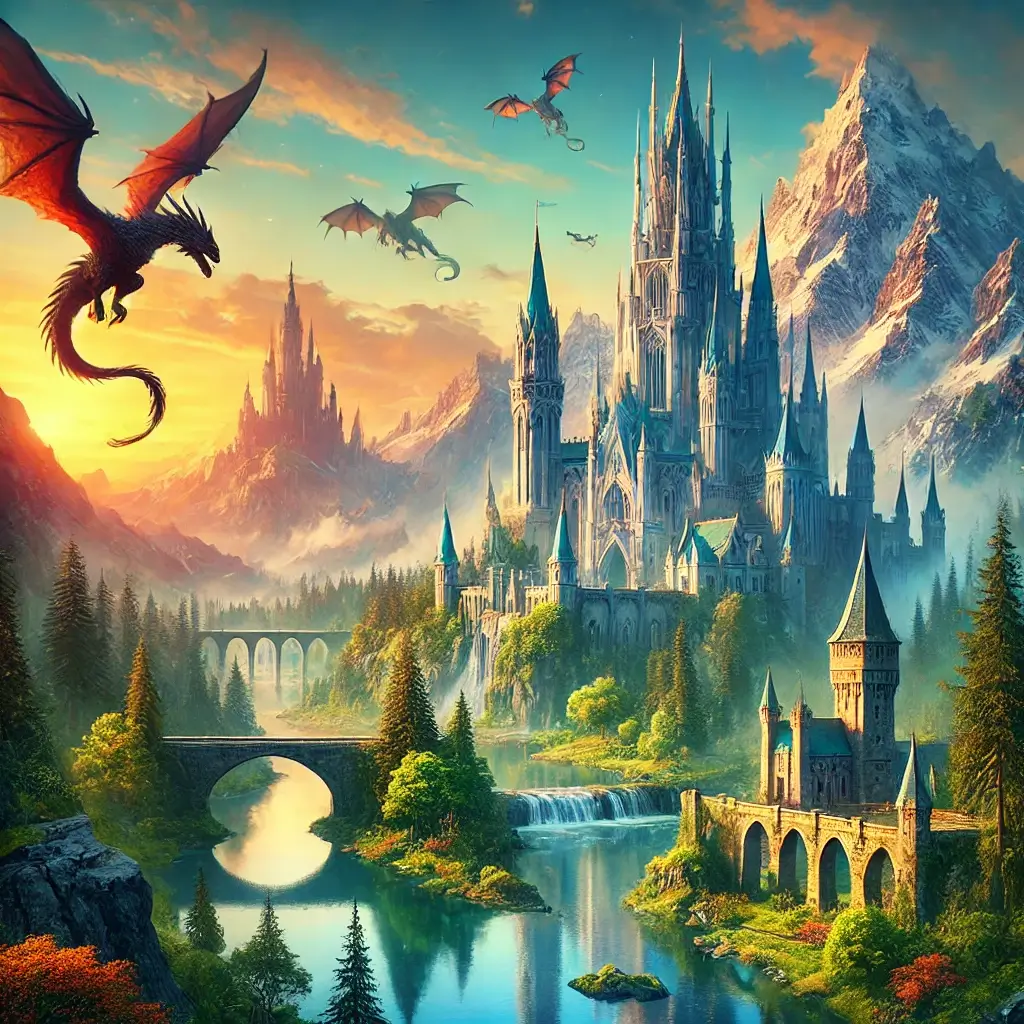Fantasy literature has always been a gateway to boundless imagination, transporting readers to worlds filled with magic, adventure, and wonder. From sprawling kingdoms to mystical realms, the best fictional worlds in fantasy literature are richly detailed and serve as the perfect backdrop for epic tales of heroism, struggle, and triumph. These worlds are so immersive and vivid that they often feel as real as the one we live in, captivating readers with their intricate histories, cultures, and landscapes. Let’s explore some of the best fictional worlds in fantasy literature and discover why they continue to enchant readers across generations.
Table of Contents
1. Middle-earth (J.R.R. Tolkien’s The Lord of the Rings)
No discussion about the best fictional worlds in fantasy literature can begin without mentioning Middle-earth. Created by J.R.R. Tolkien, Middle-earth is a sprawling world filled with ancient kingdoms, diverse cultures, and detailed languages. It’s the setting for The Lord of the Rings, The Hobbit, and The Silmarillion, offering readers a deep, immersive experience that feels like stepping into a living, breathing world.
Middle-earth stands out because of its meticulously crafted history and geography. From the towering peaks of the Misty Mountains to the peaceful Shire, every corner of Middle-earth feels real. Tolkien went as far as developing entire languages, such as Elvish and Dwarves, to give his world additional depth. The epic struggle between good and evil, personified by characters like Sauron, Frodo, Gandalf, and Aragorn, plays out against the rich backdrop of Middle-earth, making it one of the most iconic and best fictional worlds in fantasy literature.
2. Westeros (George R.R. Martin’s A Song of Ice and Fire)
George R.R. Martin’s A Song of Ice and Fire series, which inspired the popular television show Game of Thrones, introduces readers to the complex world of Westeros. Westeros is a land steeped in political intrigue, treachery, and power struggles. Unlike many other fantasy worlds, Westeros is dark, gritty, and morally ambiguous, where heroes often fail, and villains occasionally succeed.
What makes Westeros one of the best fictional worlds in fantasy literature is its realism and depth. Martin has created a complex web of noble houses, each with its own agenda, history, and ambition. The geography of Westeros, with its icy North, sunny South, and the treacherous Wall separating the realm from the dangers beyond, is intricately detailed. The world is harsh, unforgiving, and often mirrors the complexities of human nature. Its political drama, combined with the looming threat of the supernatural White Walkers, creates a narrative that captivates readers and keeps them engaged.
3. Narnia (C.S. Lewis’s The Chronicles of Narnia)
C.S. Lewis’s The Chronicles of Narnia takes readers to the magical land of Narnia, a place where animals talk, witches wield power, and children are destined to be kings and queens. Narnia is one of the most beloved and best fictional worlds in fantasy literature, particularly for younger readers. It is filled with Christian allegory, mythical creatures, and the eternal battle between good and evil, with Aslan the lion representing the ultimate force of good.
Narnia’s charm lies in its simplicity and wonder. The world is full of enchantment, with lands like the frozen wastes of the White Witch’s kingdom, the lush forests, and the grand castles that serve as seats of power. Lewis’s storytelling, combined with the magic of Narnia, creates a sense of adventure and discovery that has resonated with readers for decades.
4. The Wizarding World (J.K. Rowling’s Harry Potter Series)
The Wizarding World, created by J.K. Rowling in her Harry Potter series, has become one of the most recognizable and cherished fictional worlds in modern literature. Centered around the magical Hogwarts School of Witchcraft and Wizardry, the Wizarding World is a place where magic permeates every aspect of life. From spells and potions to magical creatures and enchanted objects, Rowling’s world is brimming with imagination and wonder.
What makes the Wizarding World one of the best fictional worlds in fantasy literature is its accessibility. Rowling seamlessly blends the magical with the ordinary, creating a world that exists parallel to our own. Readers can easily imagine stepping through a hidden portal into Diagon Alley or boarding the Hogwarts Express at Platform 9¾. The detail in the world-building, from the house-elves to the Marauder’s Map, adds layers of intrigue, while the epic battle between Harry Potter and Voldemort provides a thrilling narrative that spans across seven books.
5. The cosmere (Brandon Sanderson’s stormlight Archive and Mistborn Series)
Brandon Sanderson is a master world-builder, and his fictional universe, known as the Cosmere, is home to some of the most complex and intricate worlds in fantasy literature. The Cosmere includes several interconnected worlds, most notably Roshar (from The Stormlight Archive) and Scadrial (from Mistborn). Each world within the Cosmere has its own unique magic system, history, and cosmology, and Sanderson’s meticulous attention to detail makes the Cosmere one of the best fictional worlds in fantasy literature.
Roshar, for example, is a storm-ravaged planet where magic is fueled by storms and the mysterious spren, while Scadrial’s magic system revolves around metals and alloys. The depth of the world-building in the Cosmere is staggering, and Sanderson’s ability to tie together different worlds with an overarching narrative makes his fictional universe a marvel of modern fantasy.
6. Earthsea (Ursula K. Le Guin’s Earthsea Series)
Ursula K. Le Guin’s Earthsea series introduces readers to an archipelago of islands where magic and balance play central roles in the fabric of the world. Earthsea is one of the best fictional worlds in fantasy literature because of its philosophical depth and exploration of power, responsibility, and identity. The world of Earthsea is unique in its approach to magic, where words, names, and knowledge are powerful tools.
Le Guin’s exploration of the balance between light and dark, and the consequences of wielding power, sets Earthsea apart from other fantasy worlds. The islands, with their distinctive cultures and environments, create a vivid setting for the protagonist, Ged, as he learns the importance of restraint and wisdom in a world where magic can have far-reaching consequences.
7. Discworld (Terry Pratchett’s Discworld Series)
Terry Pratchett’s Discworld series offers readers a comedic and satirical take on fantasy. Discworld is a flat, disc-shaped world carried on the backs of four giant elephants, which stand on the shell of a massive turtle floating through space. Pratchett’s world is one of the best fictional worlds in fantasy literature due to its humor, clever social commentary, and whimsical nature.
Discworld is a mirror of our own world, often poking fun at real-world issues like politics, religion, and society. From the bustling streets of Ankh-Morpork to the magical Unseen University, Pratchett’s world is filled with quirky characters, ridiculous situations, and witty dialogue. Despite its lighthearted tone, Discworld offers a deep and thoughtful exploration of human nature, making it a beloved classic in fantasy literature.
Conclusion
The best fictional worlds in fantasy literature have a unique ability to transport readers to realms beyond their wildest imagination. Whether it’s the epic landscapes of Middle-earth, the political intrigue of Westeros, or the magical wonder of the Wizarding World, these worlds captivate and inspire readers. They are meticulously crafted, with rich histories, complex cultures, and vivid landscapes that feel as real as our own. By exploring these extraordinary worlds, readers embark on journeys filled with adventure, discovery, and timeless lessons about the human experience.
Whether you’re a fan of epic battles, political intrigue, or magical adventures, the best fictional worlds in fantasy literature offer something for everyone, providing endless opportunities for escape, exploration, and wonder.

